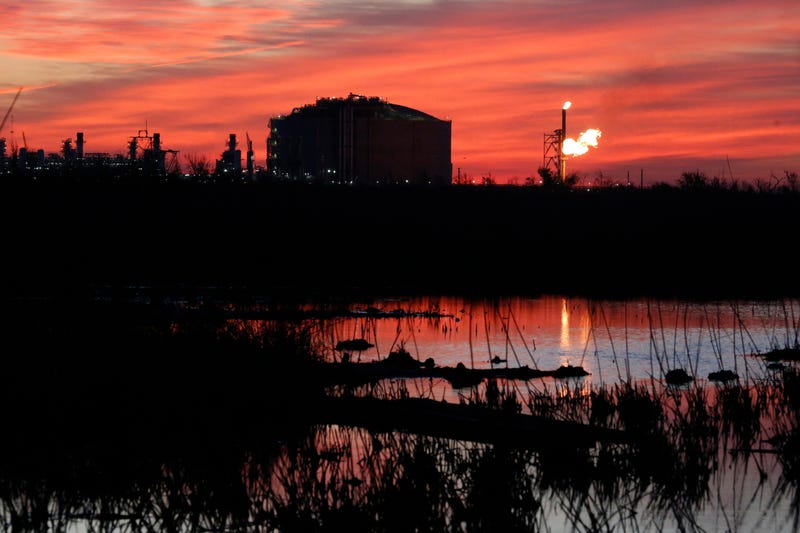
NEW ORLEANS (AP) — A Louisiana judge has tossed out a key permit for a liquefied natural gas facility that won approval from President Donald Trump's administration, ordering a state review of how the facility's planet-warming emissions would affect Gulf Coast communities vulnerable to sea-level rise and extreme weather.
Last week, a judge from Louisiana’s 38th Judicial District Court effectively halted construction of Commonwealth LNG by ordering state regulators to analyze the facility's climate change and environmental justice-related impacts, in conjunction with the broader LNG buildout in southwest Louisiana's Cameron Parish.
Three of the nation’s eight existing LNG export terminals are located in Cameron Parish, and several more are proposed or under construction there.
Louisiana’s attorney general vowed to appeal the ruling, which vacated the Louisiana Department of Conservation and Energy's coastal use permit for the facility.
“This is the first time any court has vacated a permit for an LNG facility based on the government’s refusal to consider climate change impacts,” said Clay Garside, an attorney representing the Sierra Club and other environmental groups.
Earlier this year, Trump reversed a Biden-era pause on exports of liquefied natural gas, or LNG, as part of his goal to boost natural gas exports and promote “energy dominance.”
Last year, the Biden administration's Energy Secretary Jennifer Granholm’s had warned that “unfettered exports” of liquefied natural gas would increase planet-warming greenhouse gas emissions — a statement reflecting the findings of a Department of Energy report released in December.
Trump-appointed Energy Secretary Chris Wright, a fossil fuel executive, has moved to fast-track the buildout of LNG facilities, including Commonwealth LNG, which received an export authorization within weeks of Trump's inauguration.
“Cameron Parish is ground zero for the relentless expansion of the gas export industry,” said Anne Rolfes, founder of the Louisiana Bucket Brigade, an environmental group involved in the litigation. “We’re going to stop it and this is an important step in that process.”
Lyle Hanna, a Commonwealth LNG spokesperson, said that “we are disappointed with the District Court’s decision, and we are exploring all available legal options.”
A spokesperson for the Louisiana Department of Conservation and Energy declined to comment, citing the potential of pending litigation. Louisiana Attorney General Liz Murrill said that the state planned to appeal.
“Sadly even state court judges are not immune from climate activism,” Murrill said.
Last year, a federal appeals court in Washington, D.C., had ordered the Federal Energy Regulatory Commission to reassess Commonwealth LNG's air pollution, including its greenhouse gas emissions. In June, the commission gave the project a greenlight on the grounds that its construction was in the public interest.
In regulatory filings, the Louisiana Department of Conservation and Energy said that “climate change is currently beyond the scope" of the state's regulatory review.
But District Judge Penelope Richard rejected this position, saying state environmental regulators have a duty to consider how the LNG facility, along with others clustered nearby, would impact extreme weather events, storm severity and sea-level rise in a state where a football field-worth of land disappears every 100 minutes.
Richard also ordered state regulators to analyze the facility's impacts on local communities, especially those living in poverty or relying on fishing for their livelihoods — which she noted was the “defining characteristic” of the parish. While the facility could destroy marshes, harm water quality and displace residents, the judge wrote, “none of it was considered in terms of impacts on environmental justice communities."
Commercial fisherman Eddie LeJuine, a lifelong Cameron Parish resident, applauded the ruling. He said the buildout of LNG infrastructure, including dredging for shipping channels, has significantly harmed the fishing industry.
“The fishermen are barely hanging on with a thread,” LeJuine said. "These plants are killing the estuary and killing our livelihoods. We’re getting extinct.”
In August, a dredging channel being developed by LNG firm Venture Global leaked into a nearby estuary. Local fishermen like LeJuine say the onslaught of saltwater and sediment will kill off large amounts of oyster, crab and fish.
Venture Global, which is in the process of constructing a second LNG export terminal in the parish, said it is “committed to conservation" and is working with state regulators and the community to respond to the incident.
___
Brook is a corps member for The Associated Press/Report for America Statehouse News Initiative. Report for America is a nonprofit national service program that places journalists in local newsrooms to report on undercovered issues.